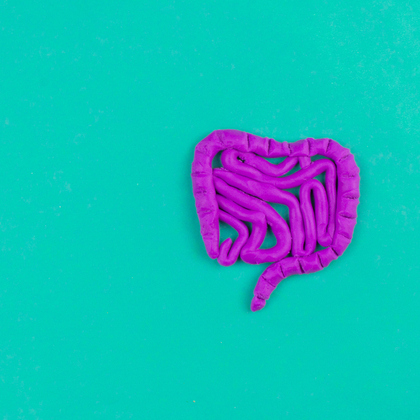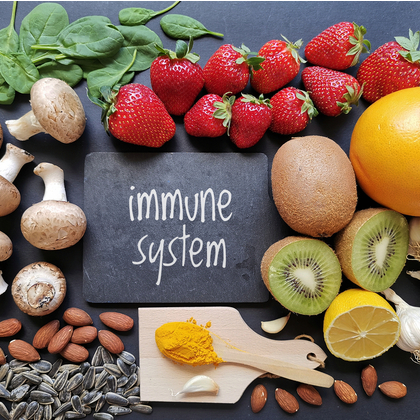
Our immune system is vital for our health. Without it we’d have no protection against harmful substances called pathogens, which include bacteria, viruses, parasites and other microorganisms that cause disease. But what is the immune system exactly, and how does it work?
Made up of different organs, cells and proteins, the immune system is considered the most complicated system in the human body after the nervous system. Some of the components of the immune system include:
-
Tonsils (found at the back of the throat)
-
Thymus (a small gland found under the breastbone and between the lungs)
-
Lymph nodes and vessels
-
Bone marrow
-
Spleen
-
Adenoids (two glands found at the back of the nasal passage)
-
Blood vessels (arteries, veins and capillaries)
Some of these store important immune system cells called white blood cells – or leukocytes – that circulate in the body in blood and lymphatic vessels. There are two main types of white blood cells: phagocytes such as neutrophils, monocytes, macrophages and mast cells that absorb and break down pathogens; and lymphocytes that produce antibodies (B lymphocytes) or destroy infected or otherwise compromised cells (T lymphocytes).
When a pathogen such as a bacterium, fungus or virus enters the body, proteins on its surface called antigens activate an immune response. Once B lymphocytes are alerted to the antigen they start making antibodies, which belong to a chemical family called immunoglobins. Some of these immunoglobins kill bacteria (immunoglobin M, or IgM) while others protect against parasites (IgE) or mark antigens for other cells to deal with (IgG).
There are also different types of T lymphocytes, the main ones of which are helper T cells (or Th cells), which co-ordinate the immune response, and killer T cells (cytotoxic T lymphocytes), which attack other cells and kill pathogens such as viruses.
Three types of immunity
Generally speaking, the more pathogens you’re exposed to, the stronger your immune system will become. This is because each time your immune system produces antibodies your body produces copies of them, then if the same pathogen gets into your system again it can be killed quickly. This could explain why children tend to pick up more colds and other viruses than adults.
There are three types of immunity:
Innate immunity
Also called the non-specific immune system, this is the immunity you’re born with and includes barriers such as the skin as well as the mucous membranes of the throat and gut.
Adaptive immunity
This is the part of your immune system that you acquire by being exposed to pathogens (and also by having vaccinations that contain antigens or weakened pathogens). This exposure helps your immune system to build up copies of antibodies that protect you against subsequent invasions of the same pathogens.
The innate and adaptive immune systems work together to react to pathogens and other harmful substances that enter the body.
Passive immunity
We don’t produce passive immunity cells, but we get them from external sources – babies get them though breast milk, for example. This type of immunity is thought to help protect babies against certain infections during the early part of their lives.
Immune system disorders
When the immune system doesn’t work properly, the result is an immune system disorder. There are several reasons why the immune system doesn’t work as it should. You may, for instance, have been born with a weakened immune system (primary immune deficiency), or you may have an immune system that’s too active or one that attacks healthy cells instead of pathogens (autoimmunity). You may also have a weakened immune system caused by a disease, called acquired immune deficiency.
Primary immune deficiency
According to the charity PID UK there are more than 300 different conditions that leave people with parts of their immune system missing or not working (i). These conditions include severe combined immune deficiency (SCID), combined immune deficiency (CID), chronic granulomatous disorder (CGD) and hyperimmunoglobin E syndrome (HIES). Susceptibility to infection is one of the most common symptoms of primary immune deficiency, which can range from mild to severe.
Acquired immune deficiency
While primary immune deficiencies are diagnosed typically during childhood, acquired immune deficiencies generally develop later in life and are often caused by using certain types of medication – immunosuppressants or chemotherapy drugs, for instance – or by having a medical condition such as diabetes or HIV infection.
Overactive immunity
A common example of a condition caused by an overactive immune system is allergy. This is when your immune system reacts to substances that are normally harmless – pollen or dust, for instance – resulting in a range of symptoms. In the case of anaphylactic shock, the immune system responds to an allergen (allergy-triggering substance) very strongly, so much so that it can be life threatening.
Autoimmunity
Immune system overactivity may also be involved in autoimmune disorders, which is when your immune system produces antibodies that attack and damage healthy body tissues by mistake. Examples of autoimmune disorders include rheumatoid arthritis, multiple sclerosis, type 1 diabetes, Hashimoto’s thyroiditis (underactive thyroid), psoriasis, inflammatory bowel disease, systemic lupus erythematosus, Graves’ disease, myasthenia gravis and vasculitis.
Immunity and ageing
While your immune system becomes stronger as you get older, thanks to the antibodies it builds up as a result of exposure to pathogens, at a certain point it also starts to change and gradually deteriorate – a process known in the medical world as immunosenescence.
According to experts writing in the Annals of the America Thoracic Society, this process usually starts during the sixth decade of life (ii). And while it’s not yet clear exactly why immunity can become less strong in older adults, the following may affect you if you’re in your 60s or older:
-
You may not respond as well to vaccinations as a younger person (though vaccinations for flu and pneumonia continue to lower sickness and death rates in older people compared with those who don’t get vaccinated (iii) ).
-
You may be more likely to be affected by infections (or the infections you get may be more severe).
-
You may take more time to recover from infections, injuries and other illnesses compared with when you were younger.
-
You may be more likely to develop an autoimmune disorder, as your immune system becomes less effective at telling the difference between harmful pathogens and healthy cells.
Nobody knows exactly why this happens, but there are a few theories. For instance, older people may produce fewer T cells than younger people, which means their immune systems may find it harder to fight off infections (iii). This could be caused by a drop in thymus gland function, though it may also be caused by other changes.
Some scientists also think that the bone marrow in older people may generate fewer of the stem cells that produce immune system cells (iii). And some types of white blood cells such as macrophages are thought to destroy bacteria, cancer cells and other antigens more slowly with age – which may explain why cancer is more common among older people (iv).
Many other possible explanations exist as to why immune system function starts to deteriorate in older people. Many strategies to restore immunity have also been put forward, including stem cell therapy, hormone therapy and calorie restriction (v) – though there’s currently a lack of human clinical trials to back up any of these approaches.
How can you support your resistance?
Much has been written about the lifestyle changes you could make to support your immune system. However currently there’s no strong evidence to suggest they really do work, thanks arguably to the fact that the immune system is so complex and there’s still so much we don’t know about it.
However, research into the effects of factors such as diet, exercise and stress – among others – is ongoing. In the meantime, following a healthy lifestyle may be a good way to support your body in general (immune system included). The argument is that anything that’s good for your general health may help keep your immune system strong and healthy too.
With that in mind, here are some of the strategies you may want to consider adopting for an overall healthier you:
-
Give up smoking (if you need support you can buy products over the counter such as patches, gum and lozenges that are designed to help with nicotine withdrawal symptoms and cravings).
-
Eat a healthy, balanced diet with at least five portions of fruit and vegetables every day.
-
Stay physically active as much as possible – aim for 150 minutes of moderate-intensity exercise every week (moderate-intensity activities will leave you warm and slightly out of breath).
-
Keep your weight in a healthy range.
-
Stick to a moderate alcohol intake – in the UK, the government currently recommends all adults drink no more than 14 units of alcohol a week on a regular basis, spreading the units evenly over three days a week or more.
-
Try to sleep well, as research suggests chronic sleep deprivation may lower the immune response (vi). Adults should aim for seven to eight hours of sleep every night (if you’re struggling with sleep, read our guide to sleep and insomnia for tips).
-
Tackle your stress levels – try to make time to do something relaxing every day.
-
Join a choir: one study has found singing not only boosts your mood, but it may regulate components of your immune system too (vii).
Natural immune system support
Besides making lifestyle changes to boost your overall health and wellbeing there are several nutritional supplements that may help support your immune system too;
High-strength multivitamin and mineral
If for any reason your diet isn’t as healthy as it should be all of the time, taking a daily multivitamin and mineral supplement may help support your health overall.
Echinacea
A popular medicinal herb, echinacea is used to relieve the symptoms of the common cold and influenza-type infections, based on traditional use only. There is also some evidence that various forms and species of echinacea may reduce cold symptoms and help you get over a cold faster (viii).
Vitamin C
An essential nutrient that’s needed for many processes in the human body, vitamin C is believed to contribute to immune defence. It supports various functions of both the innate and adaptive immune system, with deficiency leading to impaired immunity and a higher susceptibility to infections (ix). Your body cannot make vitamin C, so it has to come from food and from vitamin supplementation. Many fruits and vegetables contain vitamin C, including berries, peppers, tomatoes, citrus fruit, kiwifruit, broccoli and potatoes.
Vitamin D
Best known for maintaining bone health by helping the body absorb calcium, vitamin D is also thought to play a part in regulating innate and adaptive immunity, with deficiency associated with autoimmune issues as well as a greater susceptibility to infection (x).
However, vitamin D deficiency is thought to be common in some countries including the UK, which is why Public Health England advises that adults and children over the age of one should consider taking a daily supplement containing 10mcg of vitamin D, particularly during autumn and winter (xi).
The recommended form of vitamin D is vitamin D3 or cholecalciferol, as it’s the natural form of vitamin D that the body makes when it’s exposed to sunlight. Vitamin D3 supplements are available in tablet form, and now you can get them in veggie-friendly drops too.
However most vitamin D3 supplements are made from the fat of lamb’s wool, which means they’re unsuitable for vegans. The good news is that vegan vitamin D3 supplements sourced from lichen are now more widely available.
Elderberry
Elderberries – which grow on the Sambucus tree – have a long traditional use for the relief of colds and flu. One study investigating the effect of a elderberry extract found it reduced flu symptoms by three to four days, and that it might also be beneficial for the immune system by increasing cytokine production (xii).
Live bacteria
Acidophilus and other types of live bacteria are thought to help boost the immune system and reduce the risk of viral infections, with some studies suggesting they may help prevent and relieve symptoms of colds (xiii). Food sources of live bacteria include yoghurt, kefir, sauerkraut, miso and tempeh, but nutritional supplements that contain live bacteria are also popular.
Zinc
An important mineral for human health, zinc is also considered essential for immunity, and there’s strong evidence that zinc deficiency plays a major part in immune dysfunction in humans (xiv). One study of zinc deficiency in humans also suggests it may result in immune dysfunctions, mainly affecting Th cells (T lymphocytes) (xv).
Foods rich in zinc include meat, shellfish, legumes, nuts, seeds, dairy foods, eggs and whole grains. However, many people may not be getting enough in their diet. If you’re thinking of trying a zinc supplement, look for the mineral in its citrate form, as this is believed to be absorbed by the body more easily than some other forms.
References:
-
Available online: http://www.piduk.org/whatarepids/basics
-
Weyand. C.W., Goronzy. J.J. Aging of the Immune System. Mechanisms and Therapeutic Targets Ann Am Thorac Soc. (12016 Dec). 13(Suppl 5): S422–S428. Available online: https://www.ncbi.nlm.nih.gov/pmc/articles/PMC5291468
-
Available online: https://www.health.harvard.edu/staying-healthy/how-to-boost-your-immune-system
-
Available online: https://www.msdmanuals.com/en-gb/home/immune-disorders/biology-of-the-immune-system/effects-of-aging-on-the-immune-system
-
Dorshkind. K., DMontecino-Rodriguez. E., Signer. R.A. The ageing immune system: is it ever too old to become young again?. Nat Rev Immunol. (2009 Jan).;9(1):57-62. Available online: https://www.ncbi.nlm.nih.gov/pubmed/19104499
-
Watson. N.F., et al. Transcriptional Signatures of Sleep Duration Discordance in Monozygotic Twins. Sleep, Volume 40, Issue 1, 1 January 2017. Available online: https://academic.oup.com/sleep/article/40/1/zsw019/2952682
-
Fancort. D., et al. Singing modulates mood, stress, cortisol, cytokine and neuropeptide activity in cancer patients and carers. Ecancermedicalscience. (2016).;10: 631. Available online: https://www.ncbi.nlm.nih.gov/pmc/articles/PMC4854222
-
Goel. V., Lovlin. R., Barton. R., et al. Efficacy of a standardized echinacea preparation (EchinilinTM) for the treatment of the common cold: a randomized, double-blind, placebo-controlled trial. J Clin Pharm Ther. (2004). 29:75-84. Available online: https://www.ncbi.nlm.nih.gov/pubmed/14748902
-
Goel. V., Lovlin. R., Chang. C., et al. A proprietary extract from the echinacea plant (Echinacea purpurea) enhances systemic immune response during a common cold. Phytother Res. (2005 Sep 21). Available online: https://www.ncbi.nlm.nih.gov/pubmed/16177972
-
Carr. A.C., Maggini. S. Vitamin C and Immune Function. Nutrients. (2017 Nov).3;9(11). Available online: https://www.ncbi.nlm.nih.gov/pmc/articles/PMC5707683/
-
Aranow. C. Vitamin D and the Immune System. J Investig Med. (2011 Aug).59(6): 881–886. Available online: https://www.ncbi.nlm.nih.gov/pmc/articles/PMC3166406 Hewisom. M. Vitamin D and immune function: an overview. Proc Nutr Soc. (2012 Feb).;71(1):50-6. Available online: https://www.ncbi.nlm.nih.gov/pubmed/21849106
-
Available online: https://www.gov.uk/government/news/phe-publishes-new-advice-on-vitamin-d
-
Barak. V., Halerpin. T., Kalickman. I. The effect of Sambucol, a black elderberry-based, natural product, on the production of human cytokines: I. Inflammatory cytokines. Eur Cytokine Netw. (2001 Apr-Jun). 12(2):290-6. Available online: https://www.ncbi.nlm.nih.gov/pubmed/11399518
-
Kang. E.J., Kim. S.Y., Hwang. I.H., Ji. Y.J. The effect of probiotics on prevention of common cold: a meta-analysis of randomized controlled trial studies. Korean J Fam Med. (2013 Jan).;34(1):2-10. Available online: https://www.ncbi.nlm.nih.gov/pubmed/23372900
-
Rerksuppaphol. S., Rerksuppahol. L. Randomized controlled trial of probiotics to reduce common cold in schoolchildren. P2012 Oct. (2013 Jan).;54(5):682-7. Available online: https://www.ncbi.nlm.nih.gov/pubmed/22507276
-
Keen. C.L., Gershwin. M.E. Zinc deficiency and immune function. Annu Rev Nutr. (1990).;10:415-31. Available online: https://www.ncbi.nlm.nih.gov/pubmed/2200472
-
Prasad. A.S. Zinc in Human Health: Effect of Zinc on Immune Cells. Mol Med. (2008 May-Jun).114(5-6): 353–357. Available online: https://www.ncbi.nlm.nih.gov/pmc/articles/PMC2277319
Related Posts
Disclaimer: The information presented by Nature's Best is for informational purposes only. It is based on scientific studies (human, animal, or in vitro), clinical experience, or traditional usage as cited in each article. The results reported may not necessarily occur in all individuals. Self-treatment is not recommended for life-threatening conditions that require medical treatment under a doctor's care. For many of the conditions discussed, treatment with prescription or over the counter medication is also available. Consult your doctor, practitioner, and/or pharmacist for any health problem and before using any supplements or before making any changes in prescribed medications.

Christine
Christine Morgan has been a freelance health and wellbeing journalist for almost 20 years, having written for numerous publications including the Daily Mirror, S Magazine, Top Sante, Healthy, Woman & Home, Zest, Allergy, Healthy Times and Pregnancy & Birth; she has also edited several titles such as Women’ Health, Shine’s Real Health & Beauty and All About Health.
View More



